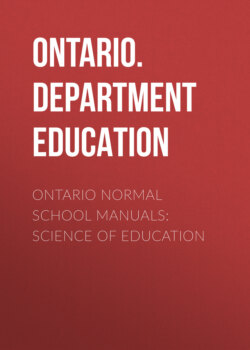Читать книгу Ontario Normal School Manuals: Science of Education - Ontario. Department of Education - Страница 38
На сайте Литреса книга снята с продажи.
CONTROL OF EXPERIENCE
ОглавлениеTable of Contents
Significance of Control.—From our previous inquiry into the nature of education, we may notice that at least two important problems present themselves for investigation in connection with the educative process. Our study of the subject-matter of education, or the school curriculum, has shown that its function as an educational instrumentality is to furnish for the child experiences of greater value, this enhanced value consisting in the greater social significance of the race experiences, or knowledge, embodied within the curriculum, when compared with the more individual experiences of the average child. It has been noted further, however, that the office of education is not merely to have the child translate this race experience into his own mind, but rather to have him add to his social efficiency by gaining an adequate power of control over these experiences. It is not, for instance, merely to know the number combinations, but to be able to meet his practical needs, that the child must master the multiplication tables. Control of experience, however, as we have seen from our analysis of the learning process, implies an ability to hold an aim, or problem, in view, and a further ability to select and arrange the means of gaining the desired end. In relation to the multiplication table, therefore, control of experience implies that a person is able to apprehend the present number situation as one that needs solution, and also that he can bring, or apply, his knowledge of the table to its solution.
Nature of Growth of Control.—The young child is evidently not able at first to exercise this power of control over his experiences. When a very young child is aroused, say by the sound proceeding from a bell, the impression may give rise to certain random movements, but none of these indicate on his part any definite experience or purpose. When, however, under the same stimulation, in place of these random movements, the child reacts mentally in a definite way, it signifies on his part the recognition of an external object. This recognition shows that the child now has, in place of the first vague image, a more or less definite idea of the external thing. Before it was vague noise; now it is a bell. But a yet more valuable control is gained by the child when he gives this idea a wider meaning by organizing it as an element into more complex experiences, as when he relates it with the idea of a fire, of dinner, or of a call to school. Before it was merely a bell; now it is an alarm of fire. So far, however, as the child is lacking in the control of his experiences, he remains largely a mere creature of impulse and instinct, and is occupied with present impressions only. This implies also an inability to set up problems and solve them through a regular process of adjustment, and a consequent lack of power to arrange experiences as guides to action. In the educative process, however, as previously exemplified, we find that the child is not a slave to the passing transient impressions of the present, but is able to secure a control over his experience which enables him to set up intelligent aims, devise plans for their attainment, and apply these plans in gaining the end desired. Growth of control takes place, therefore, to the extent to which the child thus becomes able to keep an end in view and to select and organize means for its realization.
Elements of Control.—In the growth of control manifested in the learning process, the child, as we have noticed, becomes able to judge the value, or worth, of experience. In other words, he becomes able to distinguish between the important and the trivial, and to see the relative values of various experiences when applied to practical ends. Further, he gains right feeling or an emotional warmth toward that which his intelligence affirms to be worthy, or grows to appreciate the right. Thirdly, he secures a power in execution that enables him to attain to that which his judgment and feeling have set up as a desirable end. In fine, the educative process implies for the child a growth of control by which he becomes able (1) to select worthy ends; (2) to devise plans for their attainment; and (3) to put these plans into successful execution.
